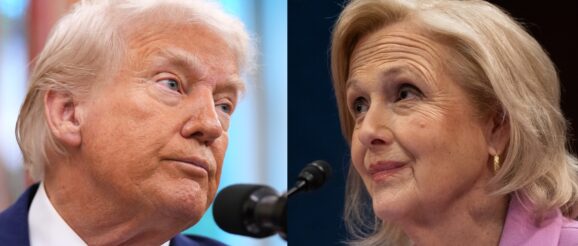PBS, Minnesota public TV station sue Trump over funding order

PBS and a public television station in rural Minnesota filed suit on Friday against President Trump over his executive order demanding that the Corporation for Public Broadcasting kill all funding for the network.
The suit alleges Trump’s order is unlawful, exceeding his authority as president and violating Constitutional protections of free speech because he has made clear he doesn’t like PBS’s news coverage and programming.
“This action challenges an uecedented presidential directive attacking PBS and its member stations… in a manner that will upend public television,” the lawsuit states.
PBS President and CEO Paula Kerger declined comment Friday.
In a statement, the network said, “After careful deliberation, PBS reached the conclusion that it was necessary to take legal action to safeguard public television’s editorial independence, and to protect the autonomy of PBS member stations.”
The White House did not immediately have a comment about the suit.
The two networks reject that characterization.
Beyond that, the lawsuit filed by PBS and Minnesota affiliate Lakeland PBS argues, “regardless of any policy disagreements over the role of public television, our Constitution and laws forbid the President from serving as the arbiter of the content of PBS’s programming, including by attempting to defund PBS.”
PBS follows and CPB into court
The public television court filings say PBS would lose $81 million per year in federal grants and “a substantial portion” of the $227 million that public TV stations pay it in order to run programs that range from children’s shows to Ken Burns documentaries. A day after Trump issued his order, the U.S. Education Department cancelled a grant to CPB and PBS that paid for a major educational initiative – about $31 million annually.
Lakeland PBS, serves a region in Northern and central Minnesota that includes some of the state’s poorest counties and several tribal reservations. The station offers the only nightly television news program covering the region and offers curricular videos, lesson plans and other resources for local educators, according to the lawsuit.
While PBS member stations receive, on average, about 15% of funding directly from CPB, Lakeland PBS relies on federal grants from CPB for 37% of its annual revenues. It says that all of the money it pays PBS for programming and other services comes from those federal funds.
PBS shows make up more than half of Lakeland PBS’s lineup.
The lawsuit contends that Lakeland PBS does not have enough unrestricted funds simply to shift other money over to pay for the cost of PBS programs. And it says that financial support from local companies is declining, not increasing. Locally based philanthropic money has been hard to come by.
“Lakeland PBS cannot readily or affordably replace such content and services,” the lawsuit states. “The EO’s indirect funding bar thus poses an existential threat to Lakeland PBS, the only local source of television programming for hundreds of thousands of Minnesotans.”
The suit was filed by Akin Gump Strauss, a major Washington-based law firm.
Trump’s order, issued on May 1st, has been rejected by the board of the privately incorporated CPB, through which federal money allocated by Congress flows to public broadcasters, primarily local stations. CPB has not adopted the president’s decree. It is suing him over another executive order purporting to fire three of its five members.
Congress awaits request to claw back funds
According to House Speaker Mike Johnson and other lawmakers, Trump is intending to send a formal request to Congress in early June to rescind the $1.1 billion it has allocated for public broadcasting for the next two years.
That spending was approved by the Republican-led U.S. House and Senate earlier this year and signed into law by Trump. It’s unclear when the House and Senate will take up the measure, but Johnson recently mentioned the rescissions package as part of a focus on enacting more spending cuts. He vowed to “act quickly.”
Congress would have 45 days to approve the rescission request, once received, for it to take effect.
